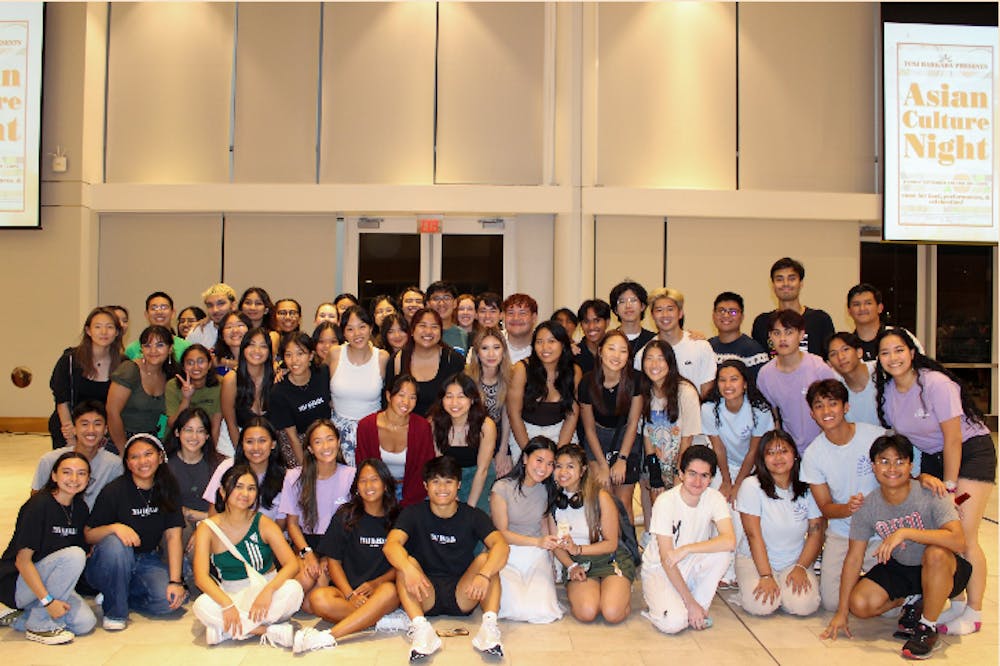By Leah Cruz
Correspondent
The enchanting sound of the bamboo sticks fills the Brower Student Center with echoes of Filipino culture as four students stand around the balcony.
Two students are crouched on the floor holding the sticks, as the other two are placed between the sticks preparing to engage in a dance of ancestral connection known as “Tinikling.”
The dancers are members of Barkada, the Filipino cultural organization at the College. Barkada is the Tagalog word for “a group of friends,” a name that perfectly encapsulates the mission and meaning of the campus club.
The group’s overall mission is to “nurture an environment that allows everyone to feel understood, and that allows everyone to understand what being Filipino is all about,” according to the organization’s website.
The Barkada club transcends the ordinary. It is a living testament to the power of culture, friendship and the shared heartbeat of a people.
General body meetings bring members together every week to get everyone acquainted and celebrate Filipino culture through a series of games, educational crafts and club bonding.
For many members, being a part of Barkada ignites a sense of belonging in an environment that is predominantly white.
“Barkada, to me, means acceptance,” said Katrina Lucero, a sophomore computer science major and the club’s performance chair. “I grew up in a predominantly white area where it was hard to find people who shared my culture.”
The club’s website shares that Barkada is one of the seven organizations that make up the Pan Asian Alliance at TCNJ. For Asian-identifying students, having a cultural club that they can join means everything.
“Having a cultural club that’s solely focused on Filipino Americans and embracing that culture was nice to find at the College,” said Lucero.
From Mystique of the East to Magkasama and Barangay, the Barkada club participates in a host of events that bring awareness of Filipino culture to non-Filipinos and provide a space for Filipino students to embrace and celebrate their culture.
Students spend months preparing and practicing dances, musical numbers and a whole array of performances that aim to showcase appreciation for Asian culture and heritage through art.
Barkada hosts a number of events that aim to educate others on the history of the Filipino people. As food is a large part of the culture, many events incorporate delicious meals like Adobo, slow-cooked meat or Halo-Halo, a cold dessert made of crushed ice and evaporated milk.
The best part about Barkada is that you do not need to be Filipino to join; it is a welcoming space for anyone who is interested in learning about the culture or even just interested in trying the mouth-watering Filipino meals.
Rachel Guloy, a senior psychology major and the club’s internal vice president, appreciates the ability to relate to other Filipino students in the club.
“Having the space to talk about yourself and identity and shared experiences with others and not having to worry about explaining yourself is what I love most about Barkada,” said Guloy. “It’s a space to appreciate your culture with other people who get it.”
Others in the club, like sophomore psychology major Miroh Alicea, feared not being accepted into Barkada.
“Because I’m mixed race, Filipino and Puerto Rican, and because I couldn’t speak the language, I had doubts about joining Barkada,” said Alicea.
Many may relate to this struggle of not feeling like they are “Filipino enough” to join the club. Alicea’s story, however, offers a gleam of hope for those who find themselves in the same situation, hesitant to join a cultural organization due to fears of not identifying as strongly with their heritage.
“I first heard about Barkada the summer before I started at the College through a member who reached out to me on Instagram asking me if I would be interested in being a part of the Filipino club on campus,” said Alicea. “She was always very welcoming and helped me feel more accepted.”
The presence of Barkada at the College has had an immense impact on the Filipino student experience, as it has created an environment that continues to foster new relationships and forge bonds between its members.
“Barkada is a special community,” said Lucero. “It’s a unique one where we all have each other’s backs.”







